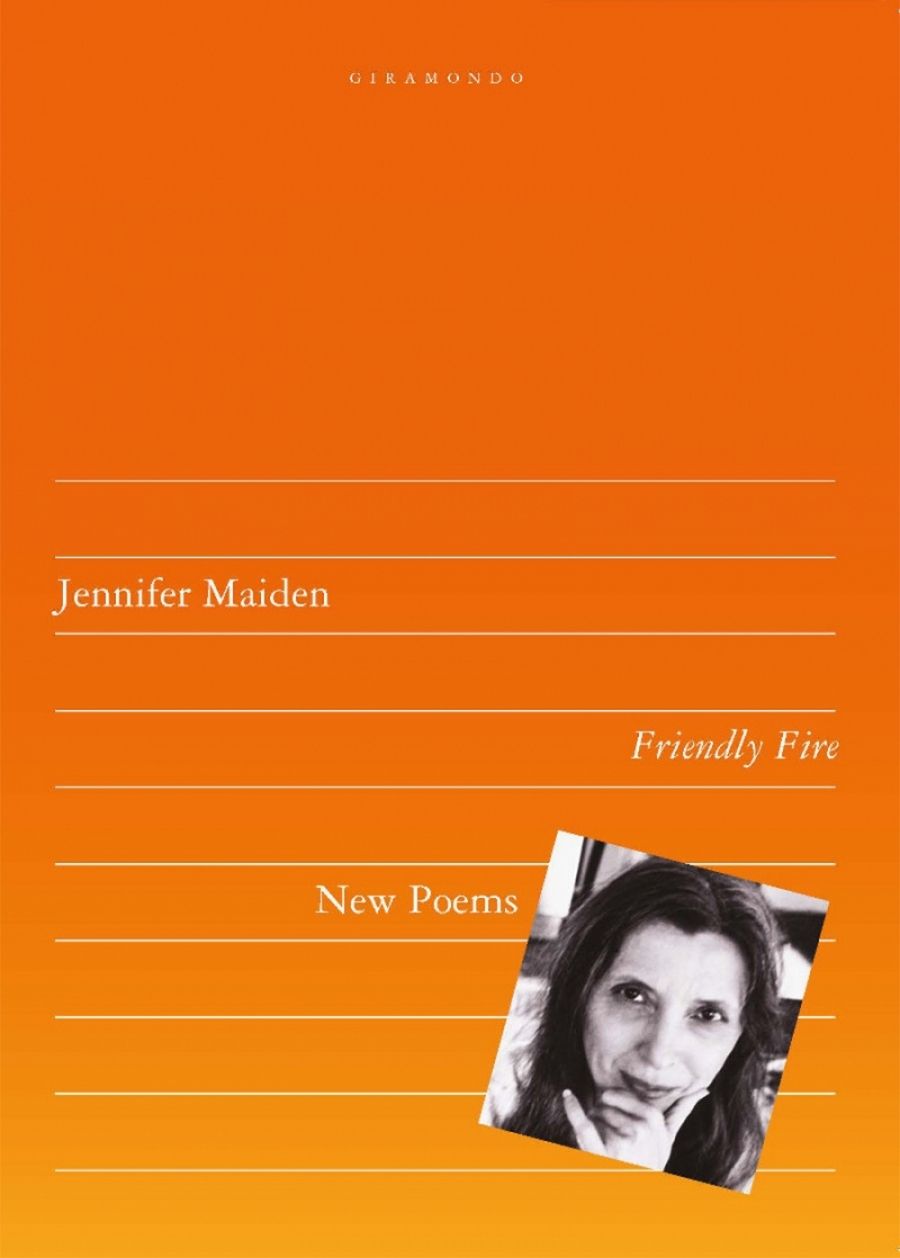
- Free Article: No
- Contents Category: Poetry
- Custom Article Title: Lisa Gorton reviews 'Friendly Fire' by Jennifer Maiden
- Review Article: Yes
- Online Only: No
- Custom Highlight Text:
When John Tranter reviewed Jennifer Maiden’s first collection, Tactics (1974), he noted its ‘brilliant yet difficult imagery’ and a style ‘so idiosyncratic and forceful in a sense it becomes the subject of her work’...
- Book 1 Title: Friendly Fire
- Book 1 Biblio: Giramondo, $21.95 pb, 100 pp, 192088212X
There is something of John Donne in Maiden’s style of deliberate incongruity; her way of juxtaposing facts and ideas from customarily distinct realms of experience. This is the wit of Donne, as Dr Johnson defined it: ‘a kind of discordia concors: a combination of dissimilar images, or discovery of occult resemblances in things apparently unlike.’ Yet the effect is different. Donne writes in a preface ‘To the Understanders’: ‘I’ll have no such readers as I can teach.’ His fantastical analogies have a dare built into them: so brilliant and precarious they create that characteristic Donne tone of bravura and vulnerability. But Maiden teases out her fantastical analogies quizzically, slowly, in free verse: testing their connections and discrepancies; testing the way we allocate pity, for instance, to some categories of experience and not others. She does this in individual poems and across sequences that she calls ‘cluster poems’: poems with almost the same start or end, though they veer off in different directions. As a consequence, her wit misses the compressed, explosive brilliance of Donne, but it gains the freedom and intimacy of a good conversation.
As a mark of this style, her poems have conversations in them: with her daughter, with ‘my painter-conservercanvasser friend’, with Bob Carr. Even a fox in one poem turns and offers reassurance; and in another, a sky-crane helicopter (an incarnation of Elvis) answers her questions about his songs, the war in Iraq, what happened to him as a soldier:
Elvis asks, ‘But didn’t the Twin Towers
feel at first like Li’l Abner, or George W,
in your mind and baby, don’t
we all have some damn mountain –
heart-warm drug and drug of horror – makes
us simple as a soldier for a time? So,
okay, I died in mine …’
In this and other poems, Maiden treats public figures as, in her words, ‘useful evocative nouns’. But they are characters, too; they answer back. In this way, Maiden takes imaginative possession of all that presents itself – on television, at home, in the news, out the window – and gives it at the same time an answering freedom. It is this style – deft, eclectic, wide-ranging – that allows her to write about the war in Iraq without the hollowness or jingoism of public speech. In a ‘cluster poem’ sequence, she sends a character from one of her novels, Play with Knives, to Kabul, Kandahar, London, Berlin, the White House, and Baghdad. In her introduction to this sequence, she explains why she uses a fictional character:
with the freedom of fiction, the horror-inhibited portions of my brain might speak. This also made sense since the almost universal response to September 11 was that it seemed like fiction. To enter and use that response rather than resist it might have a particular value …
George Jeffreys she sums up as ‘a Probation Officer turned Human Rights investigator, also a true descendant of his namesake, the Hanging Judge at the Monmouth Assizes’.
In truth, there is just enough fiction in this set-up to give Maiden’s reflections on war circumstances to inhabit. George Jeffreys starts out in New York on September 11 looking for his lover, Clare, another character from Play with Knives
People were gathering, covered in dust and ash, their grey outlines reminding me of Pompeii, or something Eugene McCarthy had said, staring down from his hotel room at the Chicago Riots, that it was ‘like a ballet of purgatory’. It was like a great ballet, too, in that all movements seemed to exist for themselves, like those of animals, with no analogous meaning.
Clare walks out of the confusion and the two of them head back to their hotel room. In bed, they discuss the consequences: the urge for retribut ion, frustrated by suicide bombers, turning to war: ‘they need to see an execution, and war isn’t about that: it’s about war and it always disappoints you.’ And so it starts: ‘George Jeffreys woke up in Kabul. / George Bush Junior was on the TV, obsessed / as usual with Baghdad …’
Perhaps only Robert Adamson and J.S. Harry have written so well on the war in Iraq. For its sheer intelligent immediacy, Maiden’s George Jeffreys sequence forms the true centre of this collection. And yet a very different poem would form its centre in a gentler world.
‘Reflected Hearth at Bowen Mountain’ declares itself from the start: ‘This is not a cluster poem. This / is a parallel poem.’ In Maiden’s lexicon, a parallel poem is a poem that shuts out the noise of war and that attends to the ongoing life she shares with her daughter. So ‘Reflected Hearth at Bowen Mountain’ is a poem about watching her daughter play the violin with her teacher by the hearth in the mountains at night:
The fire
in the glass is clearly somehow beyond
the glass. The twin violin bows move
in the glass so there are four; the two
songs, one a jig, become four; yet the black
reflective chamber, the chamber of reflection
in the night glass has silence, even
the woodsmoke smell has a dark
freezing mountain silence in it …
Along with the other parallel poems in this collection, ‘Reflected Hearth at Bowen Mountain’ suggests another meaning for the title, Friendly Fire: the fire that Prometheus stole from heaven to give life to a figure of clay.


Comments powered by CComment